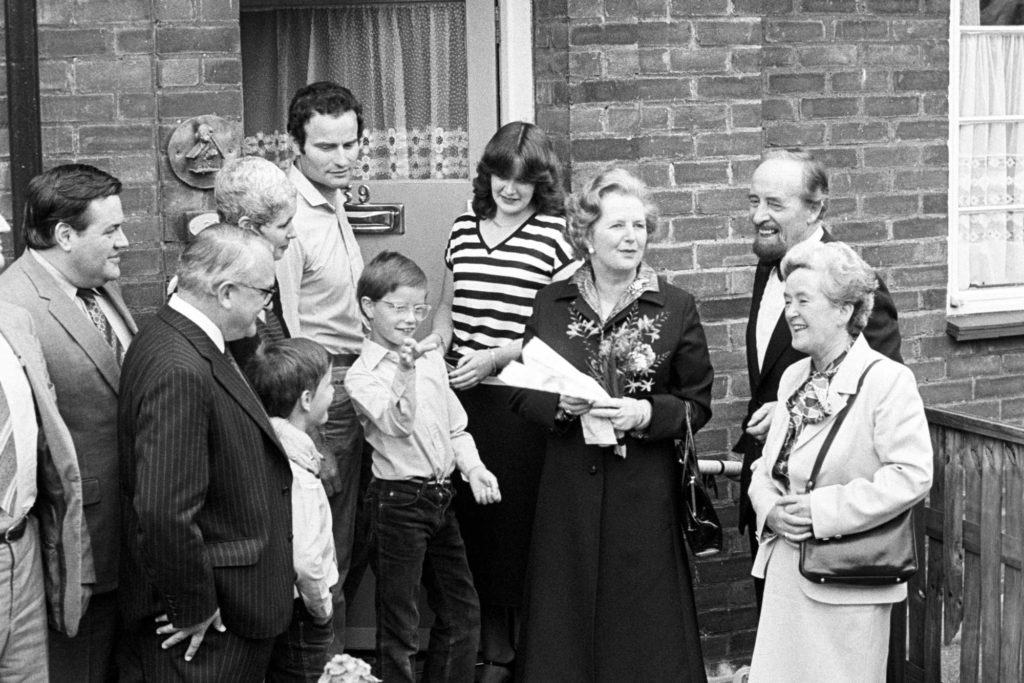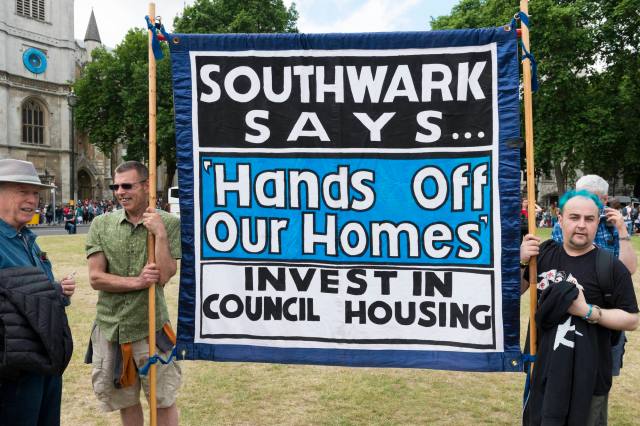Protesters with a banners on last year’s ‘March for Homes’. Credit: Ik Aldama/DPA/PA Images

This article is part of our series on the housing crisis, Home Truths.
“I don’t see the point of this Affordable Housing. Why can’t we just make housing affordable?”
David Cameron used to say this, every six months or so in the coalition years, every time the Liberal Democrats put forward another demand for increased investment in social housing. I helped put together these demands, which secured a billion here and a billion there for housing associations and councils building homes. But David Cameron was right and I was wrong. Social housing is an admission of failure in the housing market. It’s a public service we should be aiming not to need.
Everyone deserves a decent home at a price they can afford. The market doesn’t deliver that. But instead of chasing that market, trying to pick up the pieces with inadequate and insufficient state-supplied homes, we should fix it, with radical land reform and massive housebuilding.
It is hard to logically defend our system of social housing. It’s an incoherent mess. Until recent reforms, if you got into a council or housing association home, you could benefit from cheap rent for the rest of your life, no matter how much you earned. Obviously, most criticism of this has focused on the very high earners – those on £100,000 or so. But these cases are rare and trivial.
It is, however, meaningful and problematic in a community when two similar, average families – earning, say, £25,000 a year – have radically different rent costs for similar homes. The family in a council house will probably pay 30-50% less than their neighbour renting a property privately, as well as benefiting from lifetime security of tenure while their private neighbour lives in fear of being thrown out. Worse, the private tenant may have to watch as their social neighbour gets the gift of up to £100,000 from the government to buy that home at a discount through the Right to Buy.

No wonder there is so much resentment and anguish about who gets into social housing. It represents a golden ticket for the insiders, while the outsiders suffer in private rented accommodation which – for those on low incomes – is usually low quality, high cost, and unstable. What does that do for social solidarity or community cohesion? It destroys it, stoking resentment for the ‘others’ who have what you want most: a decent home – especially if those others have different colour skin, practice a different faith or speak a different language.
Social housing campaigners tend to say that we should deal with this injustice by building more social housing. Perhaps, at first glance, you might find this compelling. But it only works if you commit to building enough social homes for every single family which spends time on a low income. There are about 2.6 million families on below-average incomes living in private rented housing right now. At about £50,000 subsidy per home it would cost £129 billion to build a social home for each of them, and you still haven’t got a plan to deal with the flow of new people on low incomes. Not even John McDonnell, Labour’s hard-left Shadow Chancellor, is proposing investment of that scale – though if he did, at least we’d have a pathway to a housing policy that had some internal logic.
Letting councils borrow to build, or making developers build affordable housing alongside the homes they build to sell, may be reasonable interventions but they’re never going to make more than a dent in demand.
During the coalition years, we introduced reforms designed to reduce this perversity: we allowed social landlords to offer shorter tenancies and we let rents rise, continuing a convergence process that had started under Labour, to reduce the gap between private and social rent. These changes also helped to reduce the subsidy needed to build each home, and enabled housing associations to build more and faster. But, then, the Treasury panicked at the rising cost of housing benefit and froze rents instead, pushing building subsidies back up and putting the very financial viability of debt-laden housing associations at risk.
In the end, all we achieved was yet more mess. We certainly didn’t do what Cameron claimed he wanted, when he groaned about Affordable Housing. Housing became less affordable, on every measure, because neither he, nor his ministers nor the Liberal Democrats, for whom I worked, wanted to do anything that might threaten the real power base in this country on housing: the owner occupiers.
Those who own their own home are doped up on high house prices. Mortgaged or not, we’re attached to the idea that the price our home would fetch on the open market represents real value. The Treasury, too, is dependent on maintaining these harmful prices: invested directly in housing stock through the Help-to-Buy scheme, reliant on stamp duty and terrified of the shock to consumer confidence that falling house prices might inflict. The changes needed to actually make housing affordable, and reduce the need for state-backed housing, are just too big for our timid politicians.
There is a way from here to there, from incoherent and self-defeating policies to the dream of affordable, rather than Affordable, homes for all.
A house price shock is too risky. Instead, the Government should make a commitment to stop house prices from rising, in cash terms, for at least the next 30 years, and take all the action needed to make it happen. That would mean increasing supply, appropriately regulating housing finance, and reforming planning and land taxation. Every council should be charged with building enough to stop prices from rising in their area – with the right to grow into neighbouring council areas if their borders are too tightly constrained. If the costs of housing rose, Ministers would have to report to Parliament on their failure and their plans to correct the trend.
Setting this clear, national objective would change the investment model for land owners and housebuilders; instead of making more money the longer you wait to build, you’d make the most if you built quickly. Building council or housing association properties will be a necessary part of the mix, in the short term. For vulnerable people, in particular, this type of housing can provide essential stability and security (and the same protections must be afforded those in the private rental sector). But building a few Affordable Homes should never become an excuse for letting homes in general get less affordable.










Join the discussion
Join like minded readers that support our journalism by becoming a paid subscriber
To join the discussion in the comments, become a paid subscriber.
Join like minded readers that support our journalism, read unlimited articles and enjoy other subscriber-only benefits.
Subscribe